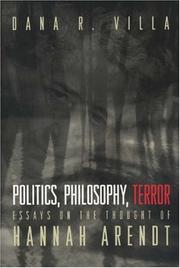| Listing 1 - 10 of 236 | << page >> |
Sort by
|
Book
ISBN: 384675952X 3770559525 Year: 2017 Publisher: Paderborn Brill | Fink
Abstract | Keywords | Export | Availability | Bookmark
 Loading...
Loading...Choose an application
- Reference Manager
- EndNote
- RefWorks (Direct export to RefWorks)
»Totalitäre Herrschaft gleich der Tyrannis trägt den Keim ihres Verderbens in sich. So wie Furcht und die Ohnmacht, aus der sie entspringt, ein antipolitisches Prinzip und eine dem politischen Handeln konträre Situation darstellen, so sind Verlassenheit und das ihr logisch-ideologische Deduzieren zum Ärgsten hin eine antisoziale Situation und ein alles menschliche Zusammensein ruinierendes Prinzip. Dennoch ist organisierte Verlassenheit erheblich bedrohlicher als die unorganisierte Ohnmacht aller, über die der tyrannisch-willkürliche Wille eines einzelnen herrscht. Ihre Gefahr ist, daß sie die uns bekannte Welt, die überall an ein Ende geraten scheint, zu verwüsten droht, bevor wir die Zeit gehabt haben, aus diesem Ende einen neuen Anfang erstehen zu sehen, der an sich in jedem Ende liegt, ja, der das eigentliche Versprechen des Endes an uns ist.« Am Grunde des Denkens von Hannah Arendt liegen die Erfahrungen des 20. Jahrhunderts. Zwei Weltkriege und die Shoah haben Verwüstung hinterlassen, wo vorher die alten Welten der abendländischen Kultur bestanden hatten. Damit ist auch der Glauben an humanistische Werte, der Glaube daran, dass der Mensch dem Menschen kein Wolf sein muss, in seinen Grundfesten erschüttert. Die Welt liegt in Trümmern und mit ihr die Menschen. Wie also weiter leben? Die Tasse zum Comic finden Sie unter www.fink.de/tassen.
Totalitarismus --- Philosophie und Auschwitz --- Hannah Arendt --- Comic
Book
ISBN: 9783846759523 9783770559527 384675952X Year: 2017 Publisher: Paderborn Brill | Fink
Abstract | Keywords | Export | Availability | Bookmark
 Loading...
Loading...Choose an application
- Reference Manager
- EndNote
- RefWorks (Direct export to RefWorks)
»Totalitäre Herrschaft gleich der Tyrannis trägt den Keim ihres Verderbens in sich. So wie Furcht und die Ohnmacht, aus der sie entspringt, ein antipolitisches Prinzip und eine dem politischen Handeln konträre Situation darstellen, so sind Verlassenheit und das ihr logisch-ideologische Deduzieren zum Ärgsten hin eine antisoziale Situation und ein alles menschliche Zusammensein ruinierendes Prinzip. Dennoch ist organisierte Verlassenheit erheblich bedrohlicher als die unorganisierte Ohnmacht aller, über die der tyrannisch-willkürliche Wille eines einzelnen herrscht. Ihre Gefahr ist, daß sie die uns bekannte Welt, die überall an ein Ende geraten scheint, zu verwüsten droht, bevor wir die Zeit gehabt haben, aus diesem Ende einen neuen Anfang erstehen zu sehen, der an sich in jedem Ende liegt, ja, der das eigentliche Versprechen des Endes an uns ist.« Am Grunde des Denkens von Hannah Arendt liegen die Erfahrungen des 20. Jahrhunderts. Zwei Weltkriege und die Shoah haben Verwüstung hinterlassen, wo vorher die alten Welten der abendländischen Kultur bestanden hatten. Damit ist auch der Glauben an humanistische Werte, der Glaube daran, dass der Mensch dem Menschen kein Wolf sein muss, in seinen Grundfesten erschüttert. Die Welt liegt in Trümmern und mit ihr die Menschen. Wie also weiter leben? Die Tasse zum Comic finden Sie unter www.fink.de/tassen.
Totalitarismus --- Philosophie und Auschwitz --- Hannah Arendt --- Comic
Book
ISBN: 9783492301756 3492301754 Year: 2013 Publisher: München : Piper,
Abstract | Keywords | Export | Availability | Bookmark
 Loading...
Loading...Choose an application
- Reference Manager
- EndNote
- RefWorks (Direct export to RefWorks)
Arendt, Hannah, --- In motion pictures. --- Hannah Arendt (Motion picture) --- Adaptations.

ISBN: 069100935X 0691009341 1282753762 1400808278 1400813743 1400823161 9786612753763 Year: 1999 Publisher: Princeton, N.J. Princeton University Press
Abstract | Keywords | Export | Availability | Bookmark
 Loading...
Loading...Choose an application
- Reference Manager
- EndNote
- RefWorks (Direct export to RefWorks)
Arendt, Hannah --- Blücher, Hannah Arendt, --- Bluecher, Hannah Arendt, --- Ārento, Hanna, --- Arendt, H. --- Arendt, Khanna, --- ארנדט, חנה --- アーレント, ハンナ,

ISBN: 0700717048 Year: 2002 Publisher: London Routledge
Abstract | Keywords | Export | Availability | Bookmark
 Loading...
Loading...Choose an application
- Reference Manager
- EndNote
- RefWorks (Direct export to RefWorks)
Arendt, Hannah --- Blücher, Hannah Arendt, --- Bluecher, Hannah Arendt, --- Ārento, Hanna, --- Arendt, H. --- Arendt, Khanna, --- ארנדט, חנה --- アーレント, ハンナ,
Book
ISBN: 3851151917 Year: 1994 Publisher: Wien Verlag für Gesellschaftskritik
Abstract | Keywords | Export | Availability | Bookmark
 Loading...
Loading...Choose an application
- Reference Manager
- EndNote
- RefWorks (Direct export to RefWorks)
Arendt, Hannah --- Blücher, Hannah Arendt, --- Bluecher, Hannah Arendt, --- Ārento, Hanna, --- Arendt, H. --- Arendt, Khanna, --- ארנדט, חנה --- アーレント, ハンナ,
Book
ISBN: 3892285853 Year: 1991 Publisher: Frankfurt am Main Haag + Herchen
Abstract | Keywords | Export | Availability | Bookmark
 Loading...
Loading...Choose an application
- Reference Manager
- EndNote
- RefWorks (Direct export to RefWorks)
Arendt, Hannah --- Blücher, Hannah Arendt, --- Bluecher, Hannah Arendt, --- Ārento, Hanna, --- Arendt, H. --- Arendt, Khanna, --- ארנדט, חנה --- アーレント, ハンナ,
Book
ISBN: 9780826499868 9780826499851 Year: 2009 Publisher: London Continuum
Abstract | Keywords | Export | Availability | Bookmark
 Loading...
Loading...Choose an application
- Reference Manager
- EndNote
- RefWorks (Direct export to RefWorks)
Arendt, Hannah --- Blücher, Hannah Arendt, --- Bluecher, Hannah Arendt, --- Ārento, Hanna, --- Arendt, H. --- Arendt, Khanna, --- ארנדט, חנה --- アーレント, ハンナ,
Book
ISBN: 0203220676 9780203220672 1135787735 1280202130 020329629X 9781135787684 9781135787721 9781135787738 9780700717040 9780415593014 Year: 2002 Publisher: London ; New York : RoutledgeCurzon,
Abstract | Keywords | Export | Availability | Bookmark
 Loading...
Loading...Choose an application
- Reference Manager
- EndNote
- RefWorks (Direct export to RefWorks)
The central argument of this book is that Hannah Arendt's deserved place in the history of Western philosophy has been overlooked, and recognition of her contribution is long overdue. In part a result of Arendt's own insistence on calling herself a 'political thinker' throughout her career, this is also due to a common tendency in philosophy to denigrate the political. This book explores the indisputable philosophical dimensions of her work. In particular, it examines Arendt's theoretical commitment to recognizing humanity as a plurality, which avoids the common mistake in Western philosophy o
Arendt, Hannah, --- Blücher, Hannah Arendt, --- Bluecher, Hannah Arendt, --- Ārento, Hanna, --- Arendt, H. --- Arendt, Khanna, --- ארנדט, חנה --- アーレント, ハンナ,
Book
ISBN: 952369071X 9523690701 Year: 2021 Publisher: Helsinki Helsinki University Press
Abstract | Keywords | Export | Availability | Bookmark
 Loading...
Loading...Choose an application
- Reference Manager
- EndNote
- RefWorks (Direct export to RefWorks)
Arendt, Eichmann and the Politics of the Past offers a critical analysis of the original American debate over Hannah Arendt’s report of the trial of Adolf Eichmann. First published in 2008, Tuija Parvikko’s book discusses both the campaign against Arendt organised by American Zionist organisations and the controversy Arendt’s report caused within American Jewish intellectual circles. Parvikko’s analysis carefully draws from the historical background of the report, discussing Arendt’s early studies of Zionism and her critique of the Jewish state. The volume also gives an account of Eichmann’s capture in Argentina and the reception of the report among legal scholars and the world press.;This edition includes a new prologue in which Parvikko reflects on her own account in connection to recent academic discussions on the controversy. The author’s analysis also covers contributions that have attempted to follow Arendt’s notion of thinking without banisters. With them, Parvikko engages in debate about going beyond Arendt’s theoretical reflections on cohabitation, sharing the world, and discussing the new political evils of the present world without pregiven norms and patterns of thought.
Holocaust, Jewish (1939-1945) --- Historiography. --- Arendt, Hannah, --- Blücher, Hannah Arendt, --- Bluecher, Hannah Arendt, --- Ārento, Hanna, --- Arendt, H. --- Arendt, Khanna, --- ארנדט, חנה --- アーレント, ハンナ, --- political judgement --- the politics of the past --- the Eichmann trial --- victimology --- political trial --- Hannah Arendt
| Listing 1 - 10 of 236 | << page >> |
Sort by
|

 Search
Search Feedback
Feedback About UniCat
About UniCat  Help
Help News
News